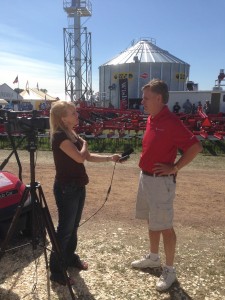
MCGA farmer-leader Bruce Peterson interviews with Michelle Rook of WNAX out of South Dakota at Farmfest 2013.
The farm bill, renewable energy and a new tax on machinery repair were three topics that generated buzz at Farmfest 2013, which started on Tuesday and wrapped up on Thursday this week in Morgan.
The Minnesota Corn Growers Association (MCGA) was once again well represented at the event. Corn farmers, MCGA partners and MCGA staff conducted 41 interviews with a variety of media outlets over the three-day event. Topics ranged from the Renewable Fuels Standard (RFS) and surging ethanol sales to farmer-led water quality initiatives and research projects.
Thousands of visitors also stopped by the MCGA tent to become members, email their congressman about passing a new farm bill, learn more about Common Ground, meet an agvocate, hear about the Green Star Farms initiative or check out a model flex fuel pump.
Over in the forum building, elected officials such as Rep. Collin Peterson and Gov. Mark Dayton talked Farm Bill and ag policy. MCGA president Tom Haag also participated in a panel with Sen. Al Franken on the future of renewable energy in America.
“Full-out war” on the RFS
In 2001, the price of oil was $23 per barrel. Today, it’s over $100.
You would think that this dramatic spike would lead to greater efforts to develop an alternative to gasoline. Instead, Big Oil continues to put up roadblocks to prevent fuels such as E85 and other ethanol-blended fuels from fairly competing in the marketplace.
“Right now, it’s full-out war on the RFS,” said POET vice president of corporate affairs Doug Berven about the Renewable Fuels Standard – legislation that requires transportation fuels sold in the U.S. to contain a minimum volume of renewable fuels like ethanol. Big Oil is attempting to have the RFS repealed, or at least lower the blending requirements.
In addition to providing a cleaner-burning and homegrown alternative to foreign oil, Haag pointed out how the RFS has led to jobs and economic activity in rural Minnesota.
“The RFS is working. We don’t need to change it or repeal it,” Haag said. “We’re growing more corn on fewer acres than ever before – enough to feed the world and fuel our cars.”
Dayton calls machinery repair tax a mistake
In the closing hours of the last Minnesota legislative session, lawmakers passed a new 7 percent tax on farm machinery repair.
On Farmfest’s final day, Gov. Dayton called the new tax, which went into effect on July 1, the “biggest mistake of the legislative session.”
“It was passed late, without much discussion or debate,” Dayton said. “We need to get rid of it and clean up the mistake in the next legislative session.”
In a July news conference in Minneapolis, Dayton also said dumping the new tax would be his first priority in the next session, if the economy allows. A June 3 editorial in the Star Tribune also called for the tax to be repealed.
Farm bill: more of the same
Unfortunately, there wasn’t much new said about the farm bill that hasn’t already been said before.
Farmers remain stuck in the middle of a food stamps squabble that is preventing a new five-year farm bill from passing. The House separated nutrition programs from farm programs in order to pass its version of the farm bill before recess. The Senate passed a farm bill that included nutrition programs earlier in the session.
The next likely step is a House vote on a separate nutrition piece of legislation that would cut around $40 billion from food stamps that, if passed, would likely die in the senate or be vetoed by president Obama.
Rep. Peterson said at Farmfest that he’s been told a vote on a separate nutrition piece of legislation will likely be held the first day back in session in early September. From there, the farm bill would enter into conference committee where the House and Senate would take another crack at developing a bill that can pass both chambers.
“Our responsibility is to make sure policies allow you to do what you do best,” Rep. Tim Walz told the crowd on Tuesday at Farmfest. “There’s an awful lot of pencil plowers in Washington right now. We can pass a farm bill. People need to understand that compromise is not a dirty word.”

